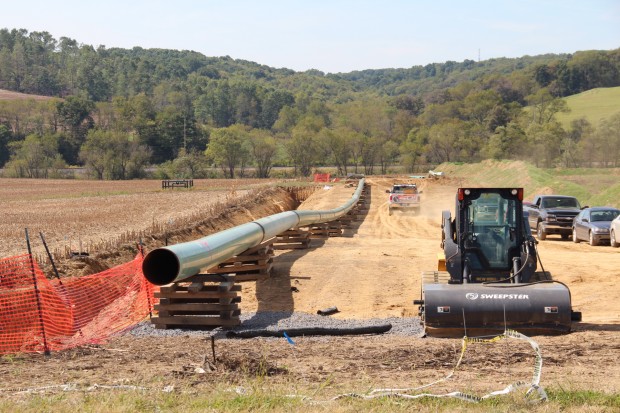Constitution Pipeline Accuses NY of 'Flagrant Misstatements' in Denying Permit

A pipeline construction site. Builders of the Constitution Pipeline say New York's decision to deny permits was based on politics, not science.
The builders of the proposed Constitution Pipeline hit back at New York State on Monday after state officials denied a water-quality permit, halting construction of the controversial natural gas line from northeastern Pennsylvania into New York State.
The pipeline builders, led by Williams Partners of Oklahoma, said the state’s Department of Environmental Conservation had made “flagrant misstatements” and “inaccurate allegations” in defense of its permit denial, and accused the DEC of acting on the basis of New York State politics rather than environmental science.
Williams said it remains “absolutely committed” to building the 124-mile pipeline, which would carry gas from the Marcellus Shale of Pennsylvania’s Susquehanna County to markets in New York and New England.
In a detailed response to the DEC decision, the company said it will pursue all legal avenues in its efforts to restart the $875 million project, including possibly taking the case to an appeals court or resubmitting the permit application.
Williams rejected the DEC’s assertion, in a statement on Friday, that the company had refused to provide a thorough analysis of the depth to which the pipeline would be buried in order to avoid damaging about 250 streams.
“Completely contrary to New York’s assertion, we provided detailed drawings and profiles for every stream crossing in New York, including showing the depth of pipe,” the company said in a statement on Monday.
“In fact, all streams were fully vetted with the NYSDEC throughout the review process,” the company said. “We are appalled with the comments that Constitution failed to provide sufficient data to ensure every crossing was totally in compliance with the NYSDEC guidelines.”
“Constitution Pipeline did not refuse to provide a comprehensive analysis of pipe depth,” the statement said. It said the partners agreed to bury the pipe at least five feet below the lowest bed elevation of the stream bed in unconsolidated bedrock, exceeding federal regulations for pipe depth.
The pipeline has been strongly opposed by environmentalists who argue that it would damage large swathes of open land and increase the use of gas obtained by the controversial process of hydraulic fracturing, or fracking.
Critics have also used the Constitution case to highlight the use of eminent domain by pipeline companies across Pennsylvania to build on land owned by people who have declined offers of compensation. Other companies including Sunoco Logistics are seeking to obtain land through eminent domain as they begin the construction of tens of thousands of miles of pipeline to expand Pennsylvania’s capacity to connect its vast gas reserves to markets.
Opponents have been active in New York State, where about 100 miles of the line is planned, and which decided in June 2015 not to permit fracking for natural gas in its portion of the Marcellus Shale.
Sean Mahar, a spokesman for the DEC, on Monday declined a request by StateImpact to respond to the company’s claims including that DEC had made inaccurate statements and ignored some of the company’s approaches.
Mahar said only that Constitution had failed in a number of ways to present “adequate information” to determine whether water-quality standards would be met.” The failures included “a lack of information on site-specific project plans for all 251 stream crossings,” he said.
Williams said it was surprised by the DEC decision to deny a Section 401 Water-Quality Certification which the company said was contrary to its dialogue with the state, and with its “collaborative effort” to address concerns.
The company argued that it worked closely with the state for more than three years to ensure that water-quality measures were met before, during and after construction. It said it agreed to re-route the line in light of DEC requests; to restore trout streams, and to provide some $27 million for wetland mitigation and the protection of migratory bird habitat.
It said the company made weekly inquiries to the DEC over the last nine months to make sure that no more information was required but state officials either ignored the questions or said no more information was needed.
“It is obvious that the NYC DEC deliberately chose to remain silent to bolster the political campaign in the state,” Williams said. Christopher Stockton, a spokesman for the company, declined to elaborate on the company’s statement that the DEC decision reflected New York politics rather than environmental science.
The company also rejected a DEC statement that it had received reports of New York landowners cutting old-growth trees along the pipeline’s right of way despite an order from the Federal Energy Regulatory Commission that prevented tree cutting along the route in that state. The DEC statement said the tree cutting had taken place “possibly with Constitution’s knowledge.”
The company said the suggestion that it had known of the alleged tree felling was “completely inaccurate.”
Stockton said DEC had made reference to the alleged tree felling in its statement despite a determination by FERC environmental monitors that the allegation was false.
In Pennsylvania, trees were cut on some properties, such as that of the Holleran family of New Milford Township, Susquehanna County, even though permitting was not complete in New York.
The DEC’s action is the latest setback for the project. In March, the company said completion of the project would be delayed by about six months until the second half of 2017 because it would not be able to complete tree felling along the route by a March 31 deadline set by the federal government to protect migratory birds.
A spokeswoman for FERC, which approved the project, declined to comment on the DEC’s action.
















